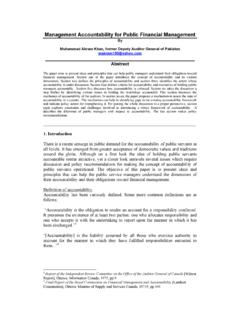Transcription of Performance Management In Zimbabwe : Review Of Current …
1 Journal of Human Resources Management and Labor Studies December 2015, Vol. 3, No. 2, pp. 1-27 ISSN: 2333-6390(Print), 2333-6404(Online) Copyright The Author(s). 2015. All Rights Reserved. Published by American Research Institute for Policy Development DOI: URL: Performance Management In Zimbabwe : Review Of Current Issues Tawanda Zinyama1, Alfred G. Nhema2 & Hudson Mutandwa3 Abstract Performance Management is a modern strategic Management approach designed to achieve desired results with available resources. Being cognisant of the fact that Governments will continue to experience fiscal space challenges, the Government of Zimbabwe decided to promote optimum utilisation of the scarce revenue streams that flow into the national fiscus. This noble goal is to be achieved through Performance Management , a key component of Results Based Management system, which emphasise achievement of tangible and high quality results from limited resources.
2 However, to vested interests, Performance Management is a subversive and revolutionary force. This paper critically traces and examines the evolution of Performance Management in Zimbabwe . Keywords: Performance Management , results based Management , Zimbabwe , accountability, corruption General Introduction Most public organisations are under the increasing demand to achieve greater results with fewer resources (Kettle 2002). The common popular complaints about government-that it does not focus on results and it wastes money-are indicative of public demands for quality services at affordable prices-in short, better Performance (Moynihan and Pandey 2005:425). 1 Department of Political and Administrative Studies, University of Zimbabwe , Zimbabwe .
3 MP 167, Mount Pleasant, Zimbabwe . E-mail: 2 Department of Political and Administrative Studies, University of Zimbabwe , Zimbabwe . MP 167, Mount Pleasant, Zimbabwe . E-mail: 3 Department of Political and Administrative Studies, University of Zimbabwe , Zimbabwe . MP 167, Mount Pleasant, Zimbabwe . E-mail: 2 Journal of Human Resources Management and Labor Studies, Vol. 3(2), December 2015 President Obama s inaugural address emphasised the need for the inculcation of a new ethics of responsibility in corporate governance, echoing earlier calls by the then British Prime Minister, Gordon Brown (2008), for moral restraint within financial sector. Performance is a predominant language of the public sector since the end of the 20th and commencement of the 21st centuries. This results-oriented strategic Management has changed the way government used to do business requiring public administrators to value results and identify the measures necessary to achieve results.
4 Both public administrators and political scientists are well into the third decade of intensive public sector Performance Management . Yet it seems, so far as the use of Performance information for public accountability purposes is concerned, governments are just beginning. There is little systematic evidence about what politicians and the public do with the data. The Government of Zimbabwe issued the Results Based Management (RBM) policy guidance circular in May 2005 (OPC-General Letter No. 6 of 2005) advising stakeholders that RBM had been adopted. This marked the fervent commitment to improve Performance in service delivery in Zimbabwe . As a contribution to the debate over the role of Performance Management in the public sector, this paper assesses the state of public sector Management in Zimbabwe by focusing on what is happening in the state and its bureaucracy in relation to governance issues.
5 Some of the issues the paper examines include: Tracing the evolution of the Zimbabwe Performance Management system from 1980 and in the process highlight some of the key attributes of the Performance Management system. Explore the effectiveness of strategies implemented to promote accountability and minimise corruption. Coming up with possible relevant alternative public sector Management options for the future . Conceptual Perspectives RBM is a shift from focusing on inputs and activities (the resources and procedure) to focusing on outputs, outcomes, impact and the need for sustainable benefits (the results of what one does). Zinyama, G. Nhema & Mutandwa 3 Results are the changes occurring as an effect of a development intervention and imply that a change of behaviour by individuals, groups of people, organisations, government bodies or society has taken place.
6 RBM has four major pillars namely, Performance budgeting, personnel Performance , monitoring and evaluation and Management information system including e-government. RBM is a strategy for achieving outcomes and impact. RBM deals with the culture of an organisation, its values, operational systems and decision making, staff and their skill and capacity and all its procedures, partners should be focussed on achieving outcomes and impact rather than activities and inputs. It aims at improving Management effectiveness and accountability in achieving results. Monitoring is very critical. Performance Management has become a political and community expectation, not just a new Management practice (Kiedrowski and Collins 2010). According to New Public Management (NPM) theory and many official pronouncements, Performance Management enhances public accountability.
7 Information about outputs and outcomes rather than inputs and internal organisational processes sharpen the sense of responsibility of those service providers who are being measured and empower those who hold them to account. In the early years of World War II, Friedrich and Finer engaged in a seminal dispute on how to organise responsibilities in modern democratic government (Friedrick 1940, Finer 1941). Their dispute was about the defining movements in the developments of the concepts of administrative responsibility and political accountability (Romzek 1996:96, Dubnick 2005:1). Fine focussed on mechanisms that ensure responsibility and accountability whereas Friedrich viewed accountability as a virtue as was clearly observed by Finer: The insistence on distinguishing responsibility as an arrangement of correction and punishment even up to dismissal of both politicians and other public officials is important.
8 Equally critical is Fredrick s view of the reliance on responsibility as a organisational virtue that should be upheld (Finer 1941:335). Both views of accountability as a personal or organisational virtue or an arrangement or mechanism are very useful for the study of and debate about Performance Management . Clearly, the concept of accountability is fundamental to the design of the Zimbabwean political system. One of the major assumptions of a democratic society is that the institutions and processes of government are designed to be answerable to the citizenry for their Performance . 4 Journal of Human Resources Management and Labor Studies, Vol. 3(2), December 2015 Global experiences In the United Kingdom (UK), a Conservative Minister praised the Performance targets set for executive agencies because they have enhanced the exercise of accountability through clearer public definition of roles (Chancellor of the Ducky of Lancaster 1997: V).
9 New Labour s Public Service Agreements (PSAs), festooned with Performance targets, were described by a former UK Chancellor as a contract with the people (Prime Minister and Minister for the Cabinet office 1999:18). In the USA, the 1993 Government Performance and Results Act (GPRA) declared that new Performance -oriented regime would: Improve the confidence of the American people in the capability of the federal government by systematically holding federal agencies accountable for achieving programme improve federal programme effectiveness and public accountability by promoting a new focus on results, service quality and customer satisfaction ( Congress, Committee on Governmental Affairs, Section 2). In sum, Performance Management can help to improve accountability of: Public officials to the citizens they serve; Public service providers to their service clients, users or customers; Public service executives to their elected bodies or appointed governing boards of their organisations; Lower-level managers and staff to higher-level managers; Executives of public service organisations; Public service contractors and grantees to the government organisations that fund and regulate their services; and Governments and public authorities to their taxpayers, ratepayers, bondholders, bond rating agencies and other users of public reports (Epstein 1992:162).
10 This clearly shows that by producing results, that is, achieving specific, pre-established Performance goals-public agencies may begin slowly to convince the citizens that government Performance is not an oxymoron (Behn 2001:119). Zinyama, G. Nhema & Mutandwa 5 Factors affecting the utilisation of Performance information include: Information arrives at the time it is needed for consequential decisions, which is usually somewhere near the beginning of the active decision making process (Pollitt 2006a); Information is presented in a concise, simple, nontechnical way and in language that the decision maker can understand and deal with (Hibbard et al 1997, Pollitt 2006a); Information comes from someone trusted and/or known to the citizen/politician (Hibbard et al.)





